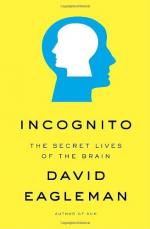
|
| Name: _________________________ | Period: ___________________ |
This test consists of 5 multiple choice questions, 5 short answer questions, and 10 short essay questions.
Multiple Choice Questions
1. What do most of us notice in the world around us?
(a) Just when something is out of the ordinary.
(b) That which impacts our safety.
(c) About ninety percent of what is actually there.
(d) About ten percent of what is actually there.
2. Of what is the phenomenon of depth being stimulated on a flat page an example?
(a) Magic.
(b) The hand is quicker than the eye.
(c) Third dimension painting.
(d) Optical illusions.
3. How does one device "show" a blind person his/her proximity to objects?
(a) It uses a series of electrodes on the back that pulsed in different ways according to the person's proximity to objects.
(b) It beeps when its sensors notice an object in the person's path.
(c) It gives a slight electrical shock to the person's arm where it is attached.
(d) It pushes the person in one direction or another when it senses an obstacle.
4. What does the author say lies underneath one's exterior looks?
(a) A simple network of interlocking pieces.
(b) A string of double helixes.
(c) A world of its own.
(d) Sophisticated machinery.
5. What does Eagleman claim most people possess?
(a) A natural tendency to dislike ourselves.
(b) A natural tendency to like others.
(c) A natural tendency to dislike ourselves.
(d) A natural tendency to like ourselves.
Short Answer Questions
1. How does Alberts convince one African that the native's tongue is still intact?
2. When does Arthur Alberts travel from New York to Africa?
3. When do major league baseball players begin their swing while batting?
4. How do photographs of different races reveal something about the mind?
5. How complex is the human brain?
Short Essay Questions
1. What is seeing and what is the most important aspect of seeing?
2. What has given greater insight into the workings of the mind since Freud's time?
3. Explain the example of the chicken sexers that Eagleman discusses.
4. How does Eagleman offer an analogy of one's awareness to a newspaper headline?
5. How is our brain wired for performing complicated tasks and why?
6. What does Eagleman say the experiment with the photographs of women illustrates?
7. Why does Eagleman say it is not correct to change lanes by turning the wheel right and then straightening it out?
8. What gap does Eagleman explore in Chapter 3?
9. Who is Mike May and what happens to him?
10. Summarize the experiment Eagleman writes about concerning photographs of women and how men responded.
|
This section contains 968 words (approx. 4 pages at 300 words per page) |

|




